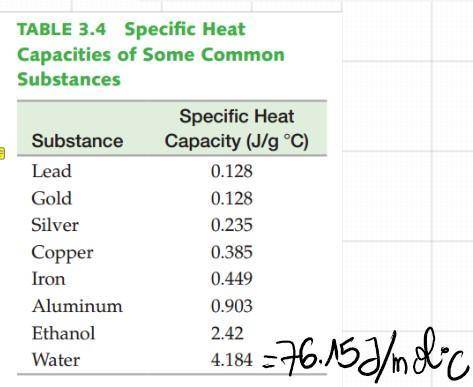
Chemistry, 30.07.2021 14:20 ddddre3909
According to the Vaporization Heat table, the heat needed for 1 mol of H2O to evaporate at 100°C is 40.7KJ and 44.0KJ/mol is needed to evaporate H2O at 25°C. Thus 44.0-40.7=3.7KJ is the energy needed to heat H2O to 100°C from 25°C.
However, according to the heat capacity of H2O, 3.7KJ will only warm the water by ~+43°C, which is not enough to reach 100°C starting from 25°C!
Am I missing something?!



Answers: 3
Another question on Chemistry

Chemistry, 22.06.2019 05:00
Use the table to identify the phase and phase changes of the elements under the given conditions. write the name of the substance, phase, or phase change
Answers: 3

Chemistry, 22.06.2019 06:40
Ted and emily played a mixed doubles tennis match against jack and brenda. in the second match. ted and brenda played against jack and emily. which type of chemical reaction does the situation demonstrate?
Answers: 3

Chemistry, 22.06.2019 11:00
When hydrochloric acid reacts with potassium hydroxide solution, the following reaction occurs. hcl (aq) + koh (aq) h2o (l) + kcl (aq) the reaction gives off heat energy, so it is an reaction.
Answers: 1

Chemistry, 22.06.2019 21:20
Phosgene (carbonyl chloride), cocl2, is an extremely toxic gas that is used in manufacturing certain dyes and plastics. phosgene can be produced by reacting carbon monoxide and chlorine gas at high temperatures: co(g) cl2(g)⇌cocl2(g) carbon monoxide and chlorine gas are allowed to react in a sealed vessel at 477 ∘c . at equilibrium, the concentrations were measured and the following results obtained: gas partial pressure (atm) co 0.830 cl2 1.30 cocl2 0.220 what is the equilibrium constant, kp, of this reaction
Answers: 2
You know the right answer?
According to the Vaporization Heat table, the heat needed for 1 mol of H2O to evaporate at 100°C is...
Questions

Mathematics, 25.07.2019 08:30


Mathematics, 25.07.2019 08:30




Mathematics, 25.07.2019 08:30





Mathematics, 25.07.2019 08:30

Spanish, 25.07.2019 08:30


Mathematics, 25.07.2019 08:30


Biology, 25.07.2019 08:30


Mathematics, 25.07.2019 08:30

English, 25.07.2019 08:30



